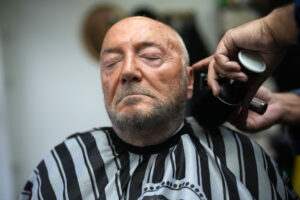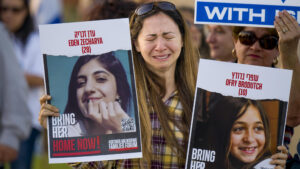The Palestinians flags come in clusters. They may dominate entire streets, hanging high on lampposts out of the reach of a stepladder should anyone be tempted to take them down. Or they gather outside shops, communal buildings and particularly around schools. Come to Tower Hamlets and you’ll soon understand the swirling mess of Britain’s politics. It is here, not Rochdale, that a community has been renamed “Little Palestine”.
When Paul Scully, the former minister for London, claimed this week that there were “no-go areas” in the city’s most deprived borough, he was rightly criticised for hyperbole. But he was tapping into a very real concern. Yes, Tower Hamlets is one of the most diverse local authorities in England, with Muslims, Jews, the white working class, and the odd hipster living cheek by jowl. But in recent months, it has become an increasingly oppressive landscape for many of its residents.
One Jewish resident, who asked to remain anonymous, tells me he is planning to sell his home and move somewhere safer. “I feel this tension all the time,” he says. “My daughter is getting comments at school about her religion and the school is surrounded by pro-Palestine flags. Even the class WhatsApp group has become a place of division and campaigning for Palestine.”
Another says: “Victoria Park is one of the central hubs of Tower Hamlets and is a place where anti-racism demos and concerts have taken place. But now almost every entrance has a Palestinian flag and it just doesn’t fit right with me. It feels like one particular community is staking a claim and the whole area has changed.”
A third resident agrees: “I’ve been here for decades but I am thinking about moving. I have changed so many habits; I’ve even stopped using the hairdressers I’ve been going to for years because there is a flag outside and I don’t want to risk hearing a conversation that will upset me. I have made about 50 calls to the council, but it hasn’t made any difference. The customer-service desk people sometimes hang up; no one wants to remove the flags and stickers.”
Nor is it only Jews who find the atmosphere intimidating. “Stepney Green is my home and I love, or did love, walking around it,” says one non-Jewish resident. “But after October 7, almost overnight, many of the main streets were adorned with Palestinian flags from almost every lamppost, on both sides of the street.
“Flags to me are symbolic of territory and possession. The first thing done, when new land was discovered or captured from another nation was to raise a flag. So now I walk down these streets and it brings a chill to my spine — it is really a physical reaction. I’m suddenly in an area where the very streets are telling me: ‘If you don’t subscribe to this way of thinking, you’re not welcome here, go somewhere else.’.”
By November, the council had, according to a response it sent to one local resident, received 355 complaints about the flags and “related paraphernalia”. But the flags stayed; many of those who wrote in received responses that explained how the borough is “inclusive”.
As a result, over the past two months, there have been a number of grassroots attempts to get rid of at least some of the flags, graffiti and stickers, with varying levels of success. “There was always a collection of stickers that I would take down, and then they would come back in greater numbers; it is a war of attrition with a neighbour I’ve never seen,” says one resident. He notes it’s a battle that isn’t without dangers. One taxi driver who drives through the area regularly was taking videos of the flags when he was spotted by locals. They later wrote to TFL and accused him of being both drunk and Islamophobic; he could potentially lose his licence if the false allegation is upheld.
More recently. Jan Evans, a Malaysian-Chinese former nurse, got into an altercation when she tried to put a placard which had been placed between a community centre and a school in the bin. “I saw this placard with a big fist and Palestinian colours. Because it looked violent, I tried to move it over to the bin, but then his man got out of his car and started screaming at me and using all sorts of expletives. He snatched the placard out of my hands and put it back and walked towards his car.”
When he drove off, she put the placard in the bin. She later wrote to the council about what had happened, only to be told not to touch any of the Palestinian paraphernalia: “I feel like the council is encouraging this — they are allowing one group to oppress the others,” she says.
As tensions simmer, the council has been forced to assume a different approach. In one response to a resident’s letter, it suggested that proposing the removal of flags could be dangerous in itself. It wrote: “The subject of Palestinian flags and their erection/removal within the borough is a matter of community tension and safety and certain information being released into the public domain is likely to contribute to issues of community safety and tension which could lead to the endangering of individuals.”
One local councillor, one of the few non-Bangladeshi representatives in an area ruled by the controversial mayor Lutfur Rahman (who was banned from standing for public office for six years in 2015 after being found guilty of electoral fraud), claims the council risks inflaming racial tensions. “This is a potential tinderbox which the police and council should not ignore,” he says, on the condition of anonymity. “It is not just the council but the police too. I had a meeting recently with a Detective Superintendent about the stickers calling for an ‘intifada’.” He claims the police officer pushed back at the idea that this could be a hate crime, although for many Jews the word intifada recalls the terrorist attacks in Israel targeting Jewish civilians. “She said she’d looked at the dictionary and spoken to some local people and had established that the word meant ‘shaking off’ or ‘tremoring’. I was shocked that she didn’t see the problem with having stickers saying that word in this context.”
Last week, an independent inquiry into the legality of the flags commissioned by the council confirmed they were illegal but, says the councillor, “they still don’t know what to do about them. I had a long meeting with council officers and they still wouldn’t say if they were going to take them down.” Tower Hamlets did not want to comment on this.
While Rushanara Ali and Apsana Begum, the borough’s two MPs, have made noises about helping with the flags’ issue, there has been little concrete action. For many in the constituency’s Labour party, this is not a surprise. For her part, Begum has been fighting internally to keep her seat, while Tasnime Akunjee, who represented Shamima Begum in court, has vowed to go up against Ali on the basis of her “refusal to vote for a ceasefire despite the overwhelming pro-Palestinian sentiment in Bethnal Green and Stepney”.
Added into this potent mix of community tensions, we can also see the malign influence of Britain’s far-Left, who have helped to fund many of the weekly pro-Palestinian marches across London, as well as many of the stickers on show in Tower Hamlets. At a recent SWP meeting at St Paul’s Church about “The Fight Against Apartheid in South Africa and Lessons for Today”, activists expressed pride at all they’re doing in Tower Hamlets. Chief among their victories, alongside the flags, was the successful “school walkout for Palestine” in November, when 300 children marched through the borough’s streets chanting “Israel is a terrorist state”.
Amid such scenes, and with local politicians failing to inspire confidence, the Government recently announced a review into Tower Hamlets council. While the investigation will largely focus on its finances, it should be noted that among the three investigators is Sir John Jenkins, who has held four Middle East ambassadorships and is an expert on the Muslim Brotherhood and Political Islamism.
The review is due to report its findings in May, though one imagines that Tower Hamlets won’t be holding its breath. For even if it resolves the issue of the flags, more pressing questions for the borough remain. What happens now, particularly with national elections due at some point this year? Can their broken community, after months of mutual suspicion, be brought back together? Or are worse things to come?
Disclaimer
Some of the posts we share are controversial and we do not necessarily agree with them in the whole extend. Sometimes we agree with the content or part of it but we do not agree with the narration or language. Nevertheless we find them somehow interesting, valuable and/or informative or we share them, because we strongly believe in freedom of speech, free press and journalism. We strongly encourage you to have a critical approach to all the content, do your own research and analysis to build your own opinion.
We would be glad to have your feedback.
Source: UnHerd Read the original article here: https://unherd.com/




